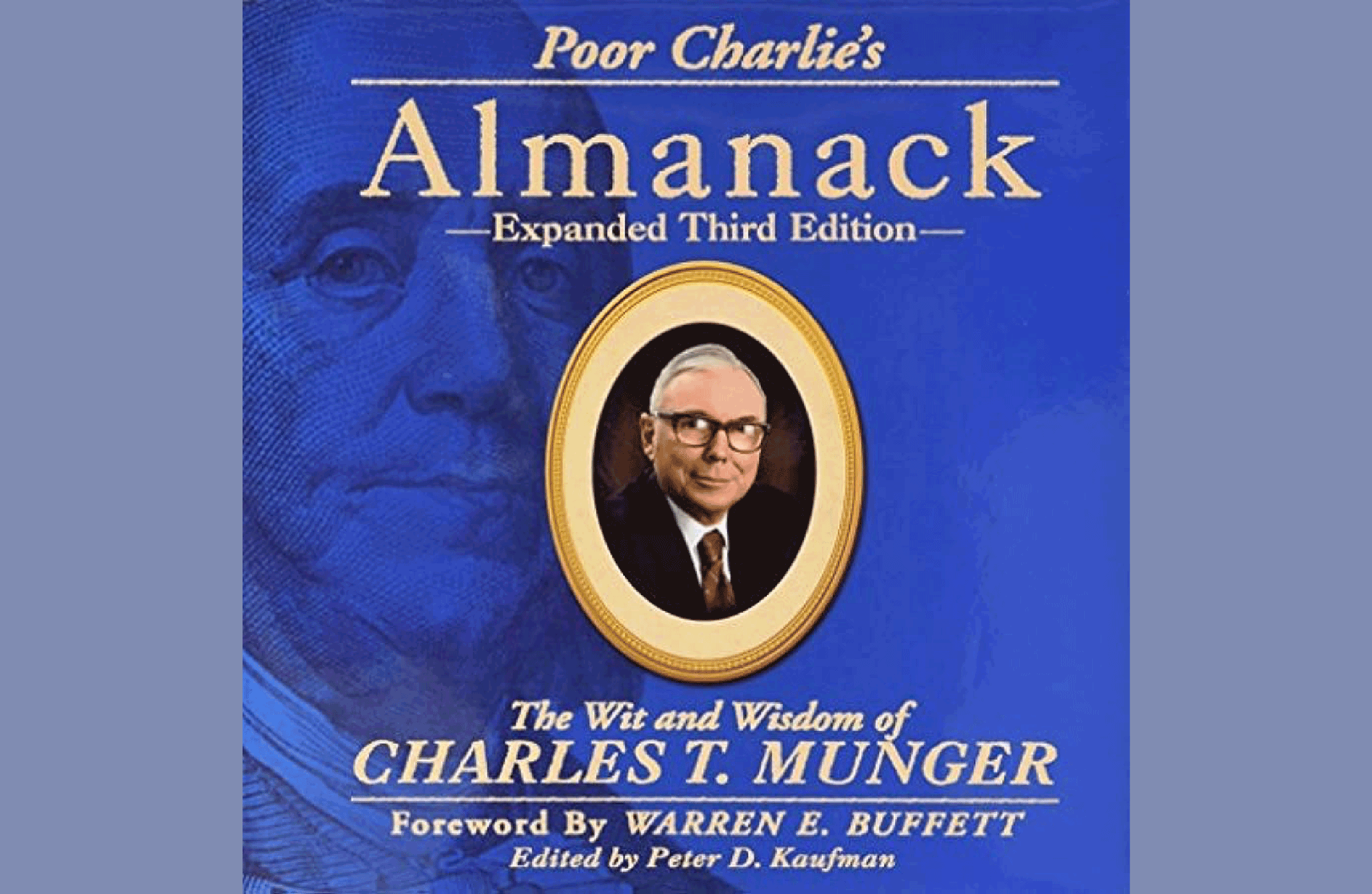5 Priceless Lessons from the Colossal Mind of Charlie Munger
Learn 5 essential lessons from Charlie Munger: value investing, multidisciplinary thinking, lifelong learning, ethics, adaptability-consistency.

Charlie Munger passed away today and was the renowned investor and Warren Buffett's trusted partner. He was not just a master of finance; he was a fountain of wisdom in decision-making, problem-solving, and entrepreneurship.
As entrepreneurs, you know that building and scaling a business is riddled with challenges. In this blog post, we'll delve into the invaluable insights from Charlie Munger's life and career and explore how his principles can serve as a blueprint for your entrepreneurial success.


1. Value Investing Principles for Your Business:
Charlie Munger is celebrated for his principles of value investing, which emphasize the importance of finding businesses with solid fundamentals and long-term growth potential. As entrepreneurs, apply these principles to your venture:
A. Know Your Business Inside Out:
Charlie Munger insists that before investing, one must thoroughly understand the business. Entrepreneurs, this applies to you as well. To succeed, you must have an intimate knowledge of your venture:
- Product Mastery: Start by delving deep into your product or service. What problem does it solve? How does it benefit your customers? Understand your offering inside out because it's the cornerstone of your business.
- Market Savvy: Munger emphasizes understanding the market, and for good reason. Study your target market diligently—its size, demographics, trends, and growth potential. Know your customers' needs, desires, and pain points.
- Competitor Awareness: Just as investors scrutinize a company's competition, entrepreneurs should know their business rivals. What are their strengths and weaknesses? How do you differentiate your business from theirs?
- Financial Acumen: Munger underscores the importance of financial literacy. As an entrepreneur, you should be well-versed in your company's financials. Track revenues, expenses, and cash flow diligently. Understand key financial ratios and metrics relevant to your industry.
B. Forge Sustainable Competitive Advantages:
Munger and Buffett seek businesses with sustainable competitive advantages or "moats." Entrepreneurs, take heed; focus on what sets your company apart:
- Innovate Fearlessly: Are you offering something genuinely unique or innovative? Invest in research and development to continually improve and differentiate your products or services.
- Quality Excellence: Strive for exceptional quality. It can be a significant competitive advantage, as customers gravitate toward offerings that consistently meet or exceed their expectations.
- Customer-Centric Approach: Providing outstanding customer service sets your business apart. Happy customers return and become advocates for your brand.
- Operational Efficiency: Efficient operations and cost control can lead to a competitive edge. Lower costs enable competitive pricing or investments in other vital areas.
- Build a Sterling Reputation: Establishing a robust brand and a positive reputation can be a competitive advantage. Customers trust businesses with a history of reliability, integrity, and excellence.

2. Multidisciplinary Thinking:
Munger's approach to problem-solving involves drawing knowledge from various disciplines. Entrepreneurs can adopt this approach by:
A. Multidisciplinary Thinking:
Charlie Munger's brilliance extends beyond the realm of investing. His problem-solving approach is rooted in synthesizing knowledge from diverse disciplines. Entrepreneurs, here's how you can harness the power of multidisciplinary thinking:
- Expand Your Horizons: Don't confine yourself to your industry's echo chamber. Embrace the richness of knowledge in psychology, economics, technology, and more. A broader knowledge base enables you to approach challenges with fresh perspectives.
- Cross-Pollination of Ideas: Innovation often blooms at the intersection of different domains. Integrating insights from various fields fosters the cross-pollination of ideas within your business. This can lead to groundbreaking solutions and approaches that set you apart.
- Stay Ahead of the Curve: In a world of constant change, staying informed about developments in diverse areas is a strategic advantage. It empowers you to adapt swiftly and seize emerging opportunities, ensuring your business remains agile and relevant.
B. Building Your Latticework of Mental Models:
At the core of Munger's multidisciplinary thinking is the concept of a "latticework of mental models." This mental framework equips you with a powerful toolset for tackling complex challenges. Here's how you can construct your latticework:
- Diverse Mental Models: Develop an array of mental models—simplified representations of how different facets of the world function. These models could span decision-making, economics, psychology, and beyond.
- Interconnected Knowledge: The beauty of a latticework is its interconnectedness. When faced with a problem, you draw from multiple mental models, weaving together different perspectives to gain a more comprehensive understanding.
- Informed Decision-Making: Your decision-making prowess receives a significant boost. With a latticework of mental models, you approach problems holistically, reducing the influence of biases and enabling more well-rounded decisions.
- Innovative Problem-Solving: Rather than resorting to cookie-cutter solutions, your latticework empowers you to craft creative and tailored responses to your business's unique challenges.

3. Continuous Learning:
Charlie Munger is a lifelong learner, and this dedication to learning has contributed to his success.
Embrace Lifelong Learning:
In the dynamic business world, standing still is akin to moving backward. The landscape constantly changes, with new technologies, market trends, and consumer behaviors reshaping the competitive terrain. Entrepreneurs who commit to lifelong learning gain a significant edge:
- Reading as Fuel: Reading is the gateway to expanding your horizons. Delve into books, articles, and research papers that pertain not only to your industry but also to adjacent fields. Seek out diverse perspectives to foster a well-rounded understanding of the world.
- Conferences and Networking: Attending industry conferences and networking events can be transformative. These gatherings offer a platform to connect with thought leaders, share insights, and stay updated on the latest developments. Engage in meaningful conversations and keep your finger on the pulse of your industry.
- Mentorship: Seek out mentors who have navigated the entrepreneurial journey successfully. Learning from their experiences, both triumphs and setbacks can provide invaluable guidance. A mentor can offer a roadmap, share insights, and help you avoid common pitfalls.
Learn from Mistakes:
Charlie Munger and Warren Buffett are renowned for their ability to admit mistakes openly and humbly. They don't view failures as dead ends but as opportunities for growth and learning. Entrepreneurs take note:
- A Growth Mindset: Adopt a growth mindset where challenges and failures are stepping stones to improvement. Understand that making mistakes is an inherent part of entrepreneurship. Embrace failures as opportunities to iterate and evolve.
- Post-Mortem Analysis: After encountering setbacks, conduct a thorough post-mortem analysis. What went wrong? What can be improved? What valuable lessons can be extracted? By dissecting failures, you pull wisdom that can guide future decisions.
- Resilience and Adaptation: Learning from mistakes fosters resilience and adaptability. You become better equipped to face adversity positively, knowing that each setback is a chance to become wiser and more prepared for the future.

4. Ethical Business Practices:
Munger's reputation for ethical conduct is a cornerstone of his success. Entrepreneurs should:
Prioritize Ethics:
Ethical considerations should be woven into the very fabric of your business strategy. Treating customers, employees, and stakeholders with integrity and fairness isn't just a moral imperative; it's a strategic imperative. Here's how to make ethics a guiding principle in your entrepreneurial journey:
- Transparency: Embrace transparency as a fundamental value. Be honest and forthright in your communications with customers, employees, and partners. Transparency builds trust, a cornerstone of ethical business.
- Fair Treatment: Ensure fairness in all your dealings. Appropriate compensation and opportunities for your employees, proper pricing for your products or services, and honest collaboration with partners are essential to ethical conduct.
- Customer-Centric Focus: Prioritize the needs and satisfaction of your customers. Ethical businesses go above and beyond to provide value, quality, and exceptional service. Happy customers not only return but also become advocates for your brand.
- Environmental and Social Responsibility: Consider the broader impact of your business on society and the environment. Sustainable practices and responsible resource management demonstrate ethical commitment and contribute to long-term viability.
Long-Term Perspective:
Charlie Munger's steadfast commitment to holding investments for the long term is a lesson in patience and far-sightedness. Entrepreneurs, too, should adopt this long-term perspective for their businesses:
- Resist Short-Term Gains: The business world is often tempted by short-term gains that may compromise ethics. However, like Munger, prioritize the long-term sustainability of your business. Avoid decisions that may yield quick profits at the expense of your reputation or stakeholder trust.
- Build Relationships: Long-term success is often built on enduring relationships. Cultivate relationships with customers, employees, and partners based on trust and shared values. These relationships form the bedrock of your business's reputation.
- Adapt Ethically: Ethical principles should guide your adaptability in a rapidly changing world. Even in times of crisis or upheaval, ethical decision-making should remain non-negotiable. Upholding your values during challenging moments reinforces your commitment to ethics.
- Community Engagement: Engage with your community positively and ethically. Giving back through philanthropic efforts and supporting local initiatives benefits society and enhances your business's standing.

5. Adaptability and Consistency:
Munger's ability to adapt and remain consistent in his principles is crucial to his success. Entrepreneurs should:
Adapt to Change:
In the dynamic and ever-evolving business landscape, adaptability is a non-negotiable survival skill for entrepreneurs. Being open to change and willing to pivot when necessary can be the difference between flourishing and floundering:
- Market Shifts: Markets can change rapidly due to technological advancements, shifts in consumer preferences, or economic fluctuations. Entrepreneurs must stay vigilant and responsive to these shifts, adjusting their strategies accordingly.
- Customer Feedback: Customer feedback is a valuable source of information. Be receptive to feedback and use it to refine your products, services, and overall business approach. Listening to your customers fosters adaptability and customer-centricity.
- Competitive Landscape: The competitive landscape is in constant flux. Monitor your competitors, identify emerging threats, and seize opportunities to gain a competitive edge. Adapt your offerings and strategies to maintain relevance.
- Technological Advancements: Embrace technological advancements as tools for growth. Leveraging new technologies can streamline operations, enhance customer experiences, and open new avenues for expansion.
Consistency in Values:
While adaptability is crucial, it should not come at the expense of your core values and principles. Consistency in values provides a stable foundation for your business and fosters trust among stakeholders:
- Defining Core Values: Clearly define your business's core values and principles. These are the ethical and moral compass that guides your decision-making. They should reflect your mission and vision for the company.
- Alignment: Ensure that your business practices, policies, and strategies align with your core values. Consistency between what you say and what you do is a hallmark of ethical and trustworthy businesses.
- Long-Term Perspective: Your core values should transcend short-term gains. Maintain a long-term perspective that prioritizes the sustainability and reputation of your business over immediate profits.
- Crisis Management: Your core values are a beacon of stability in times of crisis or turbulence. They guide ethical decision-making and reassure stakeholders that your commitment to these values remains unwavering.
- Communication: Effectively communicate your core values to your team, customers, and partners. Transparency about your principles enhances trust and fosters a sense of shared purpose.

Charlie Munger's life and career offer entrepreneurs a treasure trove of lessons. You can navigate the entrepreneurial journey with wisdom and confidence by embracing value investing principles, adopting multidisciplinary thinking, committing to continuous learning, prioritizing ethical conduct, and balancing adaptability with consistency. Remember, success in entrepreneurship, like investing, is a long-term endeavor, and the principles of Charlie Munger can serve as your trusted guide.



